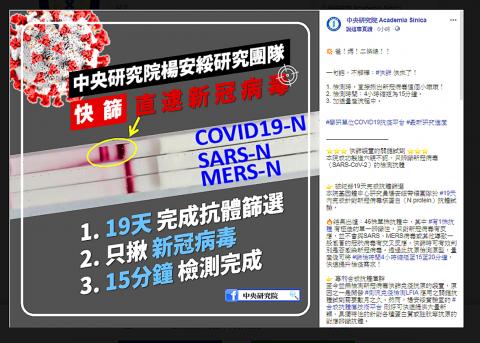Academia Sinica yesterday said that it has synthesized monoclonal antibodies that can identify the protein of the coronavirus that causes COVID-19, which it said is an important step toward producing a rapid screening reagent for the virus.
The potential reagent, if successfully mass produced, would shorten the testing time for COVID-19 from about four hours to 15 to 20 minutes, significantly improving screening efficiency, the nation’s top academic research institution said in a statement on Facebook.
Yang An-suei (楊安綏), an Academia Sinica research fellow at the Genomics Research Center who headed the team that synthesized the antibodies, said that for rapid screening to work, the reagent should accurately identify the new coronavirus.

Screen grab from Academia Sinica’s Facebook page
The team produced 46 monoclonal antibodies in just 19 days, with each sample weighing at least 1mg, based on seven human coronavirus nucleocapsid protein antigens, Yang said.
One of the antibodies has demonstrated “perfect” efficiency in identifying the new coronavirus, because it does not react to other members of the coronavirus family, including those that cause SARS and Middle East respiratory syndrome, Yang added.
Data about the antibodies would be placed on the COVID-19 platform the institute has built to share information with domestic academic and scientific research institutes to speed up the development of rapid screening kits, drugs and vaccines to combat the epidemic, Academia Sinica President James Liao (廖俊智) said.
Yang’s team achieved its goal two months ahead of schedule, Liao said.
Assisted by the Ministry of Economic Affairs, the research team would hold talks with several companies about the production of rapid screening kits based on the research results, Academia Sinica said.
If everything goes smoothly, mass production could begin soon after the Ministry of Health and Welfare verifies and approves the reagent, within the next three to four months, the institute said.
The disease has infected more than 100,000 people in more than 80 nations and territories, including Taiwan, and has killed more than 3,000 people since it was first reported in Wuhan, China, in December last year.

Chinese spouse and influencer Guan Guan’s (關關) residency permit has been revoked for repeatedly posting pro-China videos that threaten national security, the National Immigration Agency confirmed today. Guan Guan has said many controversial statements in her videos posted to Douyin (抖音), including “the red flag will soon be painted all over Taiwan” and “Taiwan is an inseparable part of China,” and expressing hope for expedited reunification. The agency last year received multiple reports alleging that Guan Guan had advocated for armed reunification. After verifying the reports, the agency last month issued a notice requiring her to appear and explain her actions. Guan

GIVE AND TAKE: Blood demand continues to rise each year, while fewer young donors are available due to the nation’s falling birthrate, a doctor said Blood donors can redeem points earned from donations to obtain limited edition Formosan black bear travel mugs, the Kaohsiung Blood Center said yesterday, as it announced a goal of stocking 20,000 units of blood prior to the Lunar New Year. The last month of the lunar year is National Blood Donation Month, when local centers seek to stockpile blood for use during the Lunar New Year holiday. The blood demand in southern Taiwan — including Tainan and Kaohsiung, as well as Chiayi, Pingtung, Penghu and Taitung counties — is about 2,000 units per day, the center said. The donation campaign aims to boost

The Kaohsiung Tourism Bureau audited six hotels in an effort to prevent price gouging ahead of Korean band BTS’ concert tour in the city scheduled for Nov. 19, 21 and 22 this year. The bureau on Friday said that the audits — conducted in response to allegations of unfair pricing posted on social media — found no wrongdoing. These establishments included the local branches of Chateau de Chine, Hotel Nikko, My Humble House, and Grand Hai Lai, it said, adding that the Consumer Protection Commission would have penalized price gougers had the accusations been substantiated. The bureau said the Tourism Development Act

The military yesterday said it has located the flight data recorder, or black box, of an F-16V jet that disappeared off eastern Taiwan earlier this month, and it would soon deploy a salvage team to try to retrieve it. Air Force Command Headquarters said that while it had pinned down the location of the black box, it was still searching for the aircraft’s sole pilot, air force Captain Hsin Po-yi (辛柏毅). Without providing details, the air force said it had located the black box days after detecting some intermittent signals and would now engage a team of professionals to retrieve it. The air